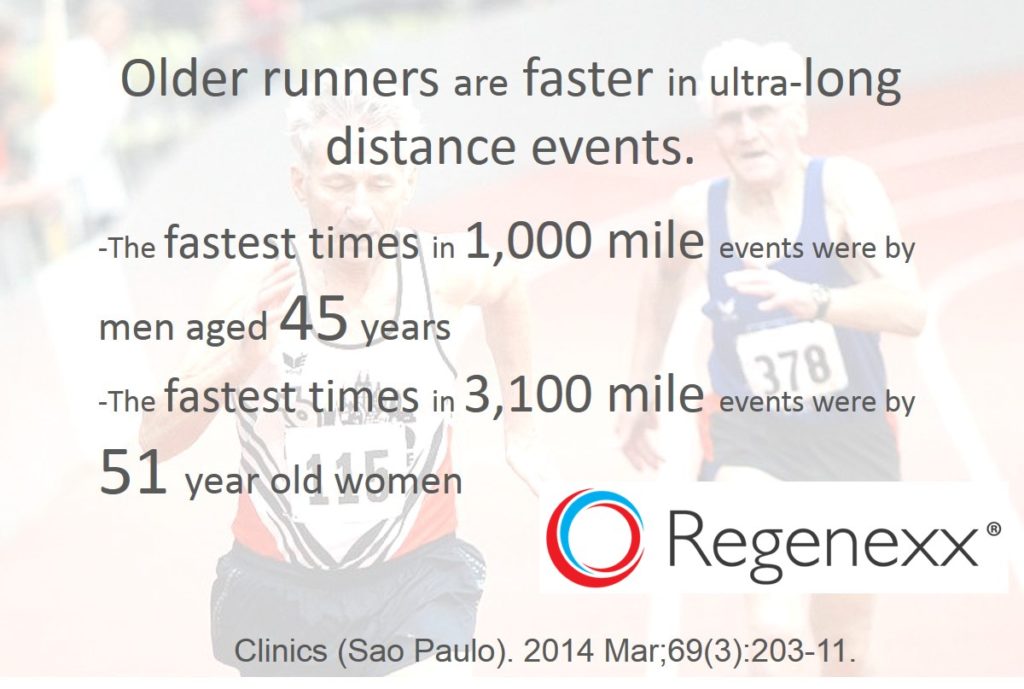Running and Aging: Would You Believe the World’s Fastest Female Ultra-marathon Age is 51?
As I was searching the US National Library of Medicine the other day I chanced upon a fascinating study. The authors indexed the ages of ultra-marathon winners (50-3,100 mile events) and calculated the age of the winners. The results were both astounding and puzzling. The younger runners were slower than the older runners!
As seen above, the fastest ages for men in these events were in their 40s. For ultra long events for women it was their 50s. I asked this question around our office and nobody guessed anywhere close, as like me, they all guessed that younger people would be winning these races. So why is this inverse relationship between running and aging happening?
First, the authors did a great job of summarizing how these ultra-long events have morphed through the years:
“In the 1970s and 1980s, ultra-marathoners were rare exceptions (2,3). Four decades later, thousands of ultra-marathoners joined ultra-endurance running events held over different distances each year (1,2,15). The number of competitions, especially at distances of 50 and 100 miles, increased. Although marathon running still gets the major publicity (23), it seemed as though ultra-marathon running has become a mass phenomenon in recent years as well (1–3). The question of why so many people would make the effort to accomplish such a grueling task has not yet been answered. Looking for a new goal in life could be an important part of the answer (24), as motivation seemed very important for ultra-marathon running (25,26). Krouse et al. (24) found general health orientation and psychological coping as the two strongest motivational factors for female ultra-marathoners.”
So what used to be the rare exception has become a mass phenomenon. The authors have also tried to explain why older runners do better in these events and perhaps one of the reasons is contained above. Most ultra-marathoners that we have treated with stem cells have a unique motivation. They view these races a bit like a mountaineer views Everest. So older endurance runners may want to simply achieve the Mount Everest of their sport.
However, if we look at the average age of all winners of marathon plus races (50 miles), it’s still in the forties. In addition, this trend towards older winners extends into other ultra-endurance sports like cycling and swimming. As a result, could there be something physiologic that explains this trend? The authors point out that VO2 max (oxygen consumption) and cardiac output decline with age, so this doesn’t quite fit. Perhaps a better explanation is that fast twitch muscle fibers (the ones that make you good at sprinting), also decline with age. Hence the ratio of slow twitch (the kind that make you good at endurance activities) to fast twitch rises as you get older. Essentially, your muscles get better at the kind of contractions that work better for endurance events.
The upshot? We seem to have more endurance as we age, perhaps thats because we have endured more of life? Or perhaps it’s just physiology? Nobody seems to be quite sure at this point!

If you have questions or comments about this blog post, please email us at [email protected]
NOTE: This blog post provides general information to help the reader better understand regenerative medicine, musculoskeletal health, and related subjects. All content provided in this blog, website, or any linked materials, including text, graphics, images, patient profiles, outcomes, and information, are not intended and should not be considered or used as a substitute for medical advice, diagnosis, or treatment. Please always consult with a professional and certified healthcare provider to discuss if a treatment is right for you.
